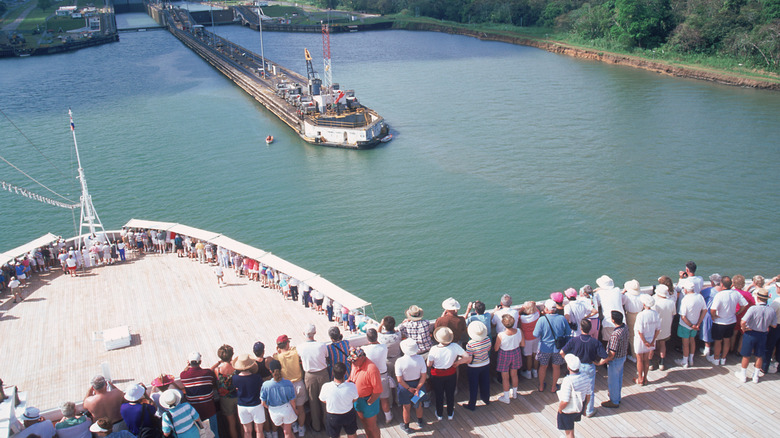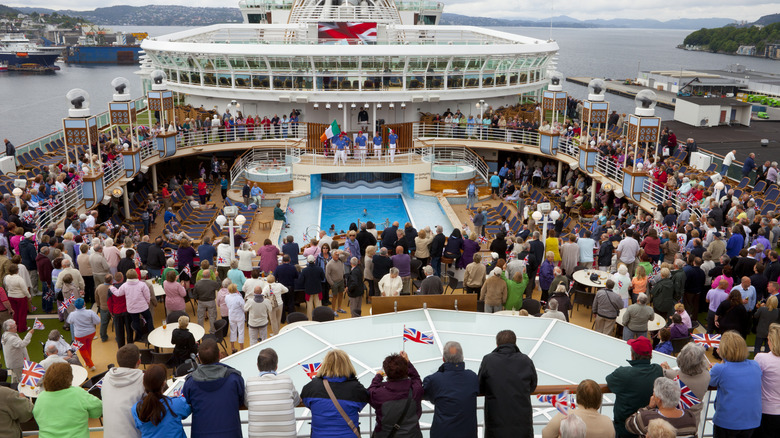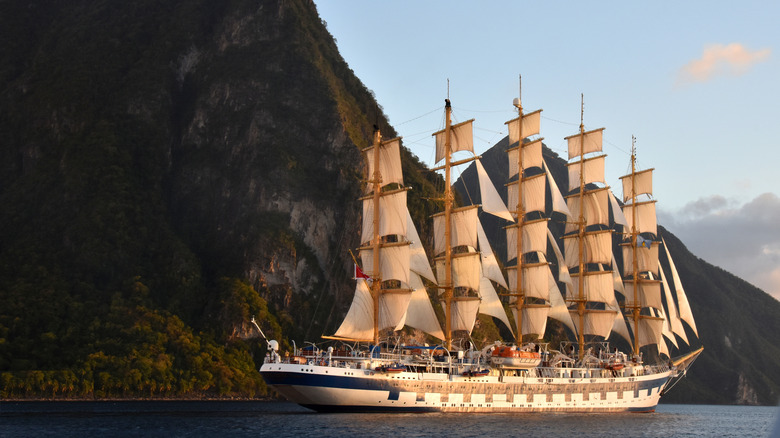Why Some People Really Hate Cruises And How To Tell If You'll Be One Of Them Beforehand
Once upon a time, boarding an ocean liner for travel was simply necessary — there was no other way to cross the ocean. Today, competing with budget airlines and long-haul flights, cruise lines have evolved to entice visitors with the glamour of sea travel. Luxury suites, gourmet dinners, water slides, casinos, and every other imaginable amenity packed into a single agenda to entertain passengers at sea is the ethos of the cruise ship experience.
Indeed, it seems to be working. The number of cruise passengers is growing. The Cruise Lines International Association has projected nearly 40 million passengers a year. According to their report, 27% of passengers in the last two years are first-time cruisers. Some people love cruising so much that they make the ship their residence, like this luxurious all-residence cruise ship that will sail to six continents.
Before putting down the money for a cruise, it's wise to ensure that you will enjoy this particular form of travel — after all, there are some unsettling reasons why cruise life is not for everyone. So, how do you know if you have a taste for cruising? Let's take a little personality quiz to see if you would survive a cruise with your sanity intact!
What to love and hate about cruises
First, how do you feel about water? Seasickness is rare on cruise ships, but not impossible. Also, if the thought of not seeing land for more than 24 hours freaks you out, cruising is not for you. Next: Are you a people person? A typical cruise ship carries about 3,000 passengers on average. You're all in it together at every buffet breakfast, lunch, and dinner. Some love the camaraderie this creates, forming lasting friendships, while others want to run and hide — except the only private place on board is your cabin.
Imagine waking up to a vacation itinerary planned for you. For some, that sounds perfect! A stress-free holiday, no organization required. If that's you, you may be a natural-born cruiser. Others itch to break free with only a limited time on shore to explore. "Structure like this can be a boon to travelers who are not as familiar or comfortable making their own way," says Alex on The Global Gadabout travel blog. "But the lack of freedom really niggles a free-spirited nomad like me."
All-inclusive or a la carte? When you buy a cruise, it's not just your cabin; there are all kinds of add-ons, and each one comes with a price tag. Wi-Fi access, specialty restaurants, shore excursions, and some onboard entertainment options all cost extra. The drink restrictions especially rankle blogger Leah Travels, who says, "I hate the idea of being at the mercy of the cruise ship when it comes to the cost of a drink. Their high prices and strict guidelines have turned otherwise honest people into boat bootleggers."
Small and educational cruise alternatives
The cruise industry realizes that mass tourism aboard a floating city is not appealing to everyone. Several smaller, more enterprising cruises now hope to entice passengers with cultural and educational itineraries rather than casinos and water slides. For example, Silversea is a luxury cruise liner with swimming pools, spas, and a maximum capacity of 600 passengers. It offers all-inclusive packages, though shore excursions may cost extra. Its unique Sea and Land Taste (S.A.L.T.) program pairs cultural experiences with onboard cooking classes and lectures. It's not cheap, though. For instance, a six-day cruise around Greece and Turkey starts at almost $3,000.
For the environmentally conscious, Star Clippers uses wind-powered tall ships. Its biggest vessel, the 439-foot Royal Clipper, carries a maximum of 227 passengers, with enough space for a piano bar, spa, and health club, but no casino or theater shows. It costs just under $1,900 for a seven-day "Yoga Cruise" along Costa Rica and Panama.
Students can earn college credit aboard Semester at Sea. Passengers don't have to be students, but be ready for college parties on board! Road Scholar's Floating Classroom caters to people over 50 years old, offering small ship cruises and guided tours by academics. If you are interested in a specific region, check out more local offers. SeaTrek in Indonesia, for example, sails traditional schooners with on-board zoologists to explore the flora and fauna around this tropical archipelago. Sound appealing? Then mark your calendars and book far in advance to save money. Prices go up the closer you get to setting sail!


